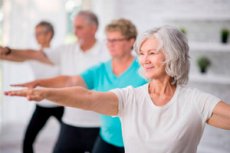New publications
Study: yoga and Mediterranean diet improve the health of the elderly
Last reviewed: 02.07.2025

All iLive content is medically reviewed or fact checked to ensure as much factual accuracy as possible.
We have strict sourcing guidelines and only link to reputable media sites, academic research institutions and, whenever possible, medically peer reviewed studies. Note that the numbers in parentheses ([1], [2], etc.) are clickable links to these studies.
If you feel that any of our content is inaccurate, out-of-date, or otherwise questionable, please select it and press Ctrl + Enter.

A recent study published in the journal Nutrients examined the combined effects of yoga and the Mediterranean diet (MD) on various health markers in older adults.
Spain has seen a significant increase in the elderly population, currently around 20%, which is projected to reach 29% by the 2060s. With age, physiological changes occur that affect nutrient absorption, appetite and the risk of malnutrition, as well as an increase in the proportion of fat mass and a decrease in muscle mass.
Older adults also experience decreased physical function, including flexibility, balance, and muscle strength, due to decreased physical activity and age-related changes in connective tissue and proprioception. These changes increase the risk of falls, injury, and decreased quality of life.
Strategies such as diet and exercise are important to combat these effects. The Mediterranean diet, which emphasizes plant foods, moderate consumption of fish, poultry, dairy products, and limited consumption of red meat, provides the necessary nutrients to maintain overall health.
Exercise, especially mind-body therapies such as yoga, offers significant benefits. Yoga improves nutrient absorption and digestion, flexibility, range of motion, and muscle strength, which contributes to improved overall health and functional independence in older adults.
This study aimed to evaluate the combined effects of a Mediterranean diet and yoga on nutrition and functional health in older adults.
The researchers used a randomized controlled trial to examine the effects of a 12-week intervention including yoga and a Mediterranean diet on flexibility, balance, grip strength, and lower body strength in non-institutionalized older adults.
The sample included 118 participants aged 65 years and older who were recruited through telephone calls and emails and met criteria such as no recent yoga participation and the ability to understand program instructions.
Participants were randomly assigned to either experimental or control groups, each with 59 participants, using a computer system, with participants and researchers blinded to group assignment.
The experimental group participated in twice-weekly yoga sessions and followed a Mediterranean diet, while the control group continued their normal activities and diet.
Data collected included demographic information, adherence to the Mediterranean diet, nutrition, flexibility, balance, and muscle strength, which were assessed before and after the intervention.
Data analysis included various statistical tests, including one-way analysis of variance (ANOVA) to compare pre- and post-intervention results, with the significance level set at p < 0.05 and effect size calculated using Cohen's d.
The study included 36.96% males and 63.04% females, with high compliance in participating in the intervention sessions (91.6%). No injuries or adverse reactions were recorded.
Following the combined intervention of yoga and the Mediterranean diet, significant improvements were observed in various health indicators.
Adherence to the Mediterranean diet showed significant group differences and improvements over time, with a significant effect size (Cohen's d = 2.18). Nutrition also improved significantly, although group differences were less pronounced (Cohen's d = 0.05).
Balance and gait showed moderate improvements, with significant differences after intervention (Cohen's d = 0.40 for balance, 0.42 for gait).
Flexibility improved significantly across body parts, with significant effect sizes for the right arm and left leg (Cohen's d = 0.43 and 0.37, respectively).
It was also found that the group that received the Mediterranean diet combined with yoga showed greater differences between pre- and post-intervention measurements for muscle strength.
Specifically, lower body strength and grip strength showed significant differences (Cohen's d = 0.39 for grip strength, 0.81 for lower body strength).
The study concluded that a 12-week intervention that combines a Mediterranean diet with yoga significantly improves nutrition, balance, gait, fall risk, flexibility and muscle strength in non-institutionalized older adults.
These results are consistent with previous research indicating the benefits of physical activity and the Mediterranean diet for older adults.
Strengths of the study include its randomized, controlled, and blinded design, high participant compliance, and large sample size, which increases the reliability of the results.
However, the study has limitations such as the inability to blind participants, the short-term nature of the effects assessed, and the integrated nature of the intervention, making it difficult to isolate the specific contributions of yoga or diet.
Future studies should consider designs with separate groups for each intervention to better understand their individual effects.
Despite these limitations, the study highlights the importance of exercise and dietary interventions to improve the health and well-being of older adults, which may help inform public health policies to promote healthy ageing and reduce the burden of chronic diseases.
